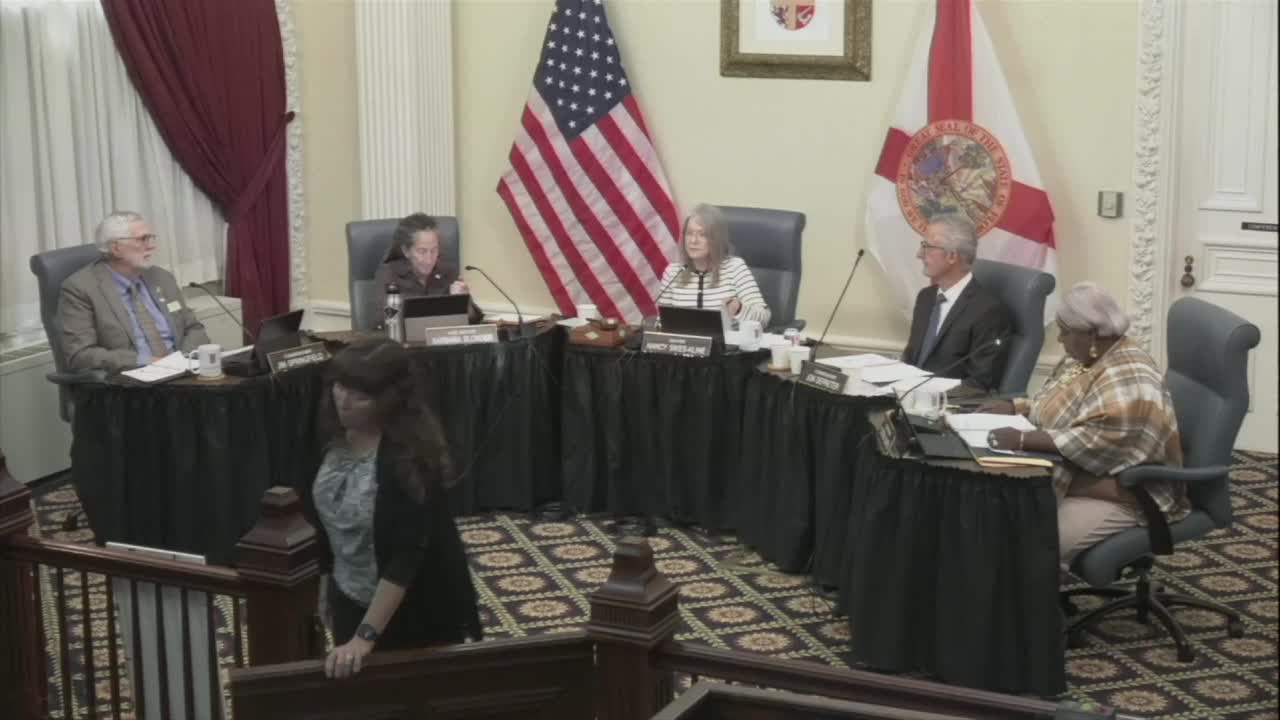St. Augustine staff to tighten oversight of horse-drawn carriage franchises after public complaints
Get AI-powered insights, summaries, and transcripts
Subscribe
Summary
City staff presented a review of the city—s animal-drawn vehicle franchises after months of public complaints about animal care, stalled recordkeeping and lease violations. Commissioners agreed the industry would remain but directed staff to return with concrete changes on facilities, heat thresholds, routes, fees and enforcement.
City staff presented an animal-drawn-vehicle franchise review at the Oct. 13 City Commission meeting after months of public complaints about horse welfare and the operation of carriage companies on city property. Commissioners heard detailed staff findings and two hours of public comment alleging poor stable conditions, reports of animal abuse and license/insurance irregularities.
The review, led by a city staff member identified in the meeting as Corey Sackard, described the legal framework and the city—s current operating setup: 15 franchise medallions authorized by the city, a one-acre city-owned stable leased to a franchisee, and a separate transfer station used for staging/maintenance. Sackard told commissioners the franchises pay either 2.5% of gross revenue or a $1,000 minimum per medallion and that city records showed one medallion unexecuted and multiple medallion holders operating from leased city property.
Why it matters: dozens of residents and animal-welfare advocates urged the commission to act after they presented police reports, photographs and video they said showed horses standing in mud, unsanitary paddocks, medical neglect and, in some instances, historic complaints of mistreatment. City staff said records and permit paperwork were incomplete in places and that a lease violation at the one-acre stable had been found and a letter issued to the tenant.
Commissioners and staff contrasted two distinct functions: the transfer station, where horses are put on trailers and staged briefly, and the one-acre stabling property, where horses remain overnight. Sackard said the lease prohibits leaving horses overnight at the transfer station and that the one-acre site is the city—s stabling facility.
Public testimony spanned a wide range of claims. Several speakers submitted police reports alleging animal abuse and named specific company operators; others, including longtime drivers and an equine chiropractor, said horses are well cared for and criticized the activists for selective footage or mistaken claims. William Cushion, identified in public comment as an operator, said, “To my knowledge, none of our horses have ever gone to a slaughterhouse.”
After hearing the staff presentation and public comments, commissioners signaled a shared direction: the carriage industry will remain but must be reformed. Council directions recorded in the meeting included requests that staff return with specific, enforceable recommendations on: - Physical improvements to the one-acre stabling property (drainage, shelter, pasture/turnout space and sanitation work); - A review and possible lowering of heat/heat-index thresholds and new nighttime temperature guidance to better protect animals; - Permanent route changes to remove carriages from Avenida Menendez and other high-speed segments for safety and mobility reasons; - A reassessment of franchise fees and a clearer fee-collection mechanism to fund enforcement and compliance monitoring; and - Stronger recordkeeping (horse inventories tied to veterinary certificates), improved charter permitting and background checks for drivers, and increased inspection and enforcement resources.
City staff also notified commissioners that, after a recent records request and site inspection, the city had issued a letter to one operator instructing removal of animals found in violation of lease terms at the one-acre stable. Sackard said staff would pursue corrective action under the lease and code as needed.
What comes next: City management told commissioners they would work with senior staff to scope and cost those changes and return with recommendations and an implementation timetable. Commissioners asked that any proposed fee or rate changes include an estimate of enforcement costs so the city can fund ongoing inspections and compliance.
Ending: The commission did not vote to suspend carriage franchises or revoke permits at the meeting. Instead, it directed staff to develop a package of regulatory, facility and enforcement changes and return to the commission for further action.
